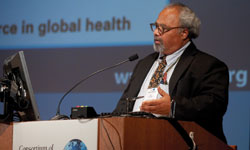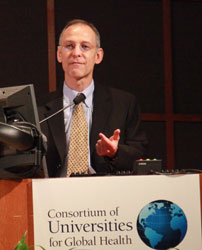Stars are aligned for global health programs at universities
September - October, 2009 | Volume 8, Issue 5

Ambassador Eric Goosby, U.S. Global AIDS
Coordinator, said he hopes to build on
PEPFAR's success to expand delivery of other
health services in host countries.

White House adviser Dr. Ezekiel Emanuel
told the Consortium of Universities for
Global Health meeting attendees that
“Getting a bigger bang for the buck is not
just an economic outcome, it is an ethical
imperative.”
To U.S. global health advocates, these may be the best of times - a confluence of public support, funding for new policy initiatives and an alliance of universities to strengthen a field that students are demanding in unprecedented numbers.
"The stars are aligned in a way we never would have anticipated, especially in a period of economic downturn," says Fogarty Director Dr. Roger I. Glass. "It's a difficult period but we are bucking the trend."
Fogarty was co-host for the first meeting of the Consortium of Universities for Global Health at the NIH campus in September, and Glass, who also is associate director of the NIH for international research and a member of the administration's Global Health Initiative steering committee, cited the following recent events:
- The president's $63 billion commitment to global health over the next six years
- New NIH Director Dr. Francis Collins's designation of global health as one of his top priorities
- Creation of the Consortium of Universities for Global Health
- Creation of a trans-NIH working group on global health, co-chaired by Glass, and the move by many Institutes and Centers to include the field in their strategic plans
- Explosive demand among college students for global health curricula
A highlight of the conference was a discussion among presidents of five leading U.S. universities with global health programs and their commitment to break down academic walls to involve experts from nonmedical fields. A CUGH survey of 37 institutions found that both undergraduate and graduate enrollment in global health programs had more than doubled since 2006.
In opening the two-day CUGH meeting, Collins told the nearly 300 leaders from 60 universities that "global health is great science, but it's also a great responsibility and a great opportunity to reach out and try to do things across the world instead of focusing so much on ourselves, so go to it ... I will be cheering and trying to help in every way I can."
White House health adviser Dr. Ezekiel Emanuel, a bioethicist with the NIH Clinical Center, and U.S. Global AIDS Coordinator Dr. Eric Goosby emphasized the administration expects concrete "deliverables," not just measures of procedural progress in the efforts against infectious and chronic diseases and maternal and child mortality.
"Getting a bigger bang for the buck is not just an economic outcome," Emanuel said. "It is an ethical imperative" because wasting money means "someone else will not get a resource that could have been more valuably used."
Goosby said the administration's Global Health Initiative will be a seed for a broader discussion that will move from bilateral to multilateral" efforts and use the success of the President's Emergency Program for AIDS to expand delivery of other health services in host countries.
He said it is incumbent on those countries to develop their own cadre of credentialed health care workers by working with national medical and nursing schools. One of the more difficult problems, he said, is getting governments to improve civil service pay in order to retain their best researchers and clinicians, who frequently move to better positions in the private or nonprofit sectors.
Both officials strongly supported integrating overseas health services programs to avoid duplication among U.S., private and nonprofit organizations and making emergency programs flower into long-term infrastructure improvements in developing countries.
At a meeting of Fogarty's advisory board, Jennifer Klein, a senior adviser in the State Department's Office of Global Women's Issues, confirmed administration support for the role of universities in fashioning details of the Global Health Initiative. "We very much have in mind to seek input and an ongoing partnership with the academic community," she said.
Support also came from Capitol Hill, where Rep. Betty McCollum, D-Minn., co-chair of the Congressional Global Health Caucus, hosted a CUGH briefing, where Dr. Judith Wasserheit, vice chair of global health at the University of Washington, proclaimed Fogarty "a secret weapon and a real hidden jewel" that trains "the vast majority" of health policy leaders in the developing world at a cost of less than 1/4 of 1 percent of the total NIH budget.
Former House Health Appropriations subcommittee chair John Porter, R-Ill., now chair of the advocacy group Research!America, cautioned that "politics is unpredictable and good leaders in office today could be gone tomorrow." He said increased funding for global health "will take time, but in my judgment it can be done."
According to Research!America President Mary Woolley, there is widespread public support, with 81 percent of respondents in a survey it commissioned believing either strongly or somewhat that it is important for the United States to work for global health through research.
In addition to Fogarty, sponsors of the meeting were:
- Bill and Melinda Gates Foundation
- Rockefeller Foundation
- National Institute of Allergy and Infectious Diseases
- The Foundation for the National Institutes of Health
To view Adobe PDF files,
download current, free accessible plug-ins from Adobe's website.